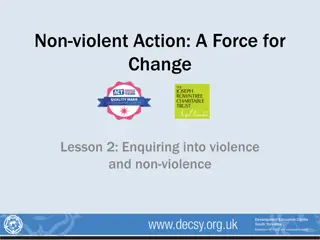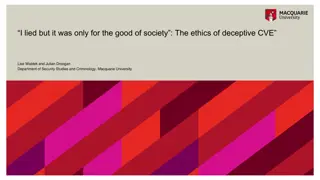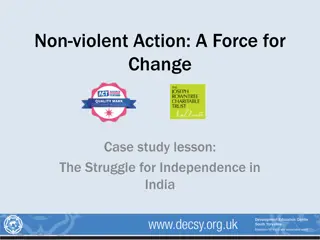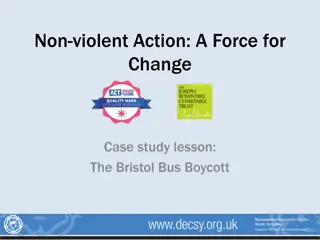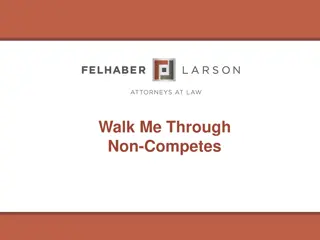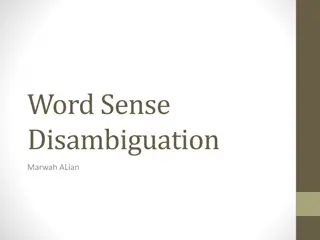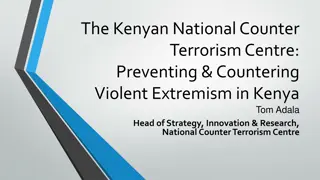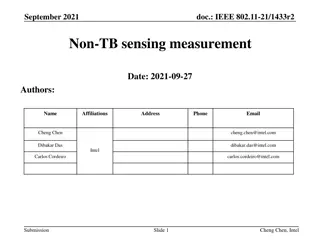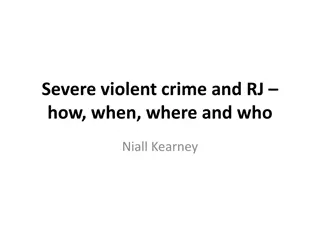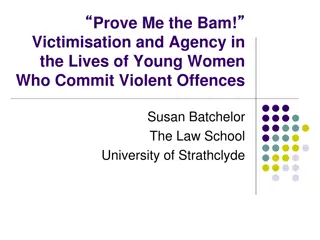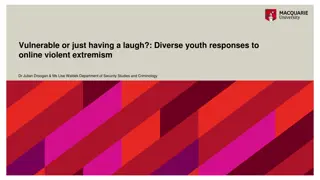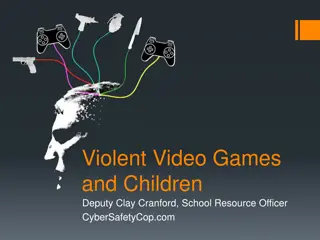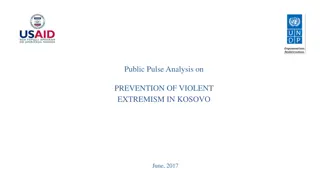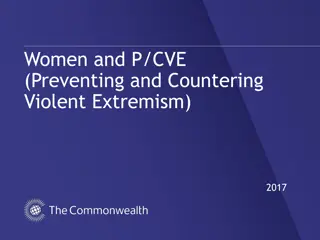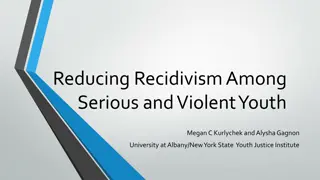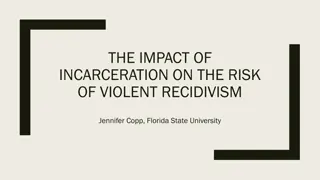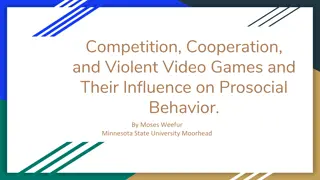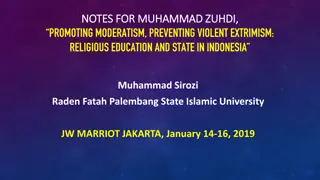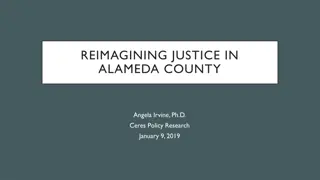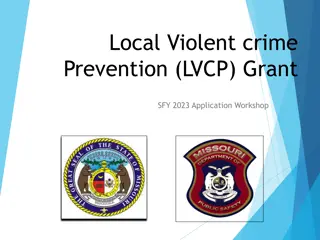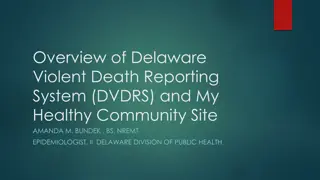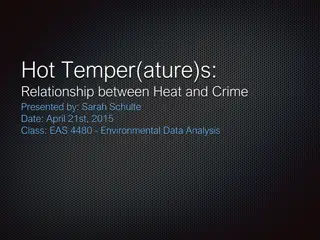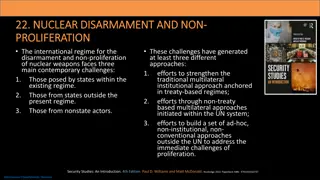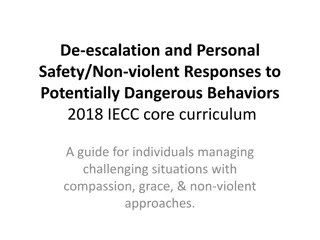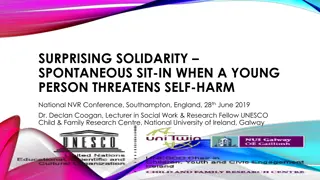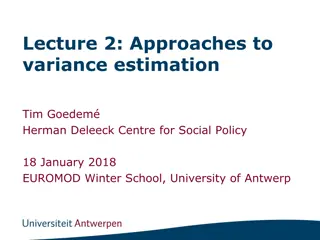Uncovering the Violent History of Capitalistic Enclosures
Explore the historical context of capitalist enclosures, their violent impacts on peasants, and the moral justifications used to conceal these atrocities. Delve into how economic narratives created moral bubbles to justify violent acts, as examined through the lens of Marx's analysis. Unveil the par
1 views • 11 slides
Addressing Violent and Aggressive Behavior in Scottish Schools
Recent Stirling survey results reveal a concerning rise in violent and aggressive incidents towards teachers, highlighting systemic issues such as lack of investment in education, societal factors, and increased mental health issues. The lack of support and follow-up post-incident is a common issue
0 views • 20 slides
Exploring Violence and Non-Violence in Actions
Explore the spectrum of violent and non-violent actions through examples like hitting back, protesting, killing animals, and more. Consider where each action falls on the spectrum and the reasons behind it. Reflect on various scenarios involving actions that range from harmful to peaceful, delving i
2 views • 14 slides
Understanding Non-Aqueous Solvents: Types and Classification
Inorganic non-aqueous solvents play a crucial role in chemical research and industry. This article by Dr. Princy K.G. delves into the classification of solvents based on protonicity, polarity, and aqueous vs. non-aqueous nature. It explores the types of non-aqueous solvents, such as protonic and non
1 views • 29 slides
Deceptive CVE Strategies and Ethical Considerations in Countering Violent Extremism
Exploring the complexities of implementing online CVE programs to divert youth from violent extremist narratives, this article discusses the use of counter-narratives, ethical challenges of deception, and the importance of reflexivity in program design and implementation.
0 views • 13 slides
Non-Violent Action for Independence: The Indian Struggle
The struggle for independence in India against British rule led by Gandhi through non-violent action, focusing on the Salt March and defiance of the British Salt Act. The movement aimed to unite Indians across communities and regions towards self-rule, highlighting the power of non-violence as a for
0 views • 20 slides
Non-Violent Action: The Bristol Bus Boycott Case Study
Explore the impactful Bristol Bus Boycott, a pivotal moment in history showcasing non-violent action for change. Dive into the reasons behind the boycott, stimulate discussions, research general knowledge questions, and evaluate the methods used through various activities and resources provided.
0 views • 15 slides
Approaches to Study Comparative Politics: Traditional vs. Modern Perspectives
This chapter discusses the importance of approaches in the study of comparative politics, categorizing them into traditional and modern perspectives. Traditional approaches include philosophical, historical, and traditional institutional approaches, highlighting their strengths and limitations. Mode
0 views • 7 slides
Understanding Non-Firm Quantities in Electricity Markets
Non-Firm Quantities in electricity markets involve units with non-firm access not being compensated for their non-firm capacity not getting accommodated on the system. The concept of Firm Access Quantity plays a key role in determining compensation levels for units, with differences in implementatio
0 views • 6 slides
Understanding Non-Compete Agreements: Enforceability and Requirements
Non-compete agreements are commonly used in the United States to protect businesses from competition by former employees. To be enforceable, these agreements must meet certain requirements, including independent consideration, protection of legitimate business interests, and reasonableness in scope,
0 views • 26 slides
Tackling Knife Crime: A Community Approach to Preventing Violence
Serious violence, particularly knife crime, poses a significant challenge in the UK. The rise in violent offenses, especially those involving weapons, necessitates a proactive approach to prevent young individuals from joining gangs or carrying weapons. Initiatives such as the Serious Violence Strat
1 views • 17 slides
Understanding Word Sense Disambiguation: Challenges and Approaches
Word Sense Disambiguation (WSD) is a complex task in artificial intelligence that aims to determine the correct sense of a word in context. It involves classifying a word into predefined classes based on its meaning in a specific context. WSD requires not only linguistic knowledge but also knowledge
2 views • 12 slides
Preventing & Countering Violent Extremism in Kenya: The NCTC Efforts
The Kenyan National Counter Terrorism Centre (NCTC) is actively involved in preventing and countering violent extremism, particularly focusing on groups like Al Shabaab and ISIS in Kenya and the region. The NCTC collaborates with organizations like ICSVE to create counter-narrative videos for preven
3 views • 10 slides
Comparison of Trigger-based vs. Non-Trigger-based Sensing Measurement in IEEE 802.11
The document discusses the differences between Trigger-based (TB) and Non-Trigger-based (Non-TB) sensing measurement instances in IEEE 802.11 standards, focusing on who initiates the sensing measurement. TB sensing is initiated by the AP, while Non-TB sensing is initiated by a non-AP STA, enabling o
6 views • 13 slides
Restorative Justice Practices in Responding to Severe Violent Crime by Niall Kearney
This collection of images and information presents insights into restorative justice approaches for severe violent crimes. It discusses the ethical framework, EU guidance, timing considerations, resource utilization, and key stakeholders involved in the process. Also, it highlights the importance of
2 views • 7 slides
Victimisation and Agency in Young Women Who Commit Violent Offences
This study delves into the victimisation and agency experienced by young women who commit violent offences, exploring their subjective perceptions of violence, sources of self-perception, impact on behavior, and portrayal in societal discourses.
0 views • 26 slides
Overview of Criminal Justice Realignment in California
California's Criminal Justice Realignment, implemented in September 2011, involves shifting custody of certain non-violent, non-serious, non-sex offenders to county control. This initiative also establishes Postrelease Community Supervision and changes the state parole revocation process. The reform
3 views • 58 slides
Understanding Youth Responses to Online Violent Extremism
Diverse youth responses to online violent extremism are explored in this research, aiming to understand how and why young audiences consume and produce such content. The study delves into how young people define and engage with online violent extremist content, shedding light on their emotional and
0 views • 13 slides
Contemplating Violent Texts in the Bible: Insights from Deuteronomy
In the Bible, violent acts are attributed to the will of God, both through supernatural and human means. Dr. Emanuel Gerrit Singgih explores the presence of violence in the Scripture, specifically focusing on the term "kherem" in the book of Deuteronomy. By examining these texts, the article sheds l
0 views • 21 slides
Understanding Sportsmanship Policies and Violent Ejection Penalties in Athletics
General sportsmanship expectations in NJCAA competitions emphasize respect for all participants. Violent behavior, including physical contact or abusive language, results in immediate ejection and suspension. Learn about the consequences and guidelines for maintaining sportsmanship in athletic event
0 views • 21 slides
Impact of Violent Video Games on Aggressive Behavior in Children
Research highlights how violent video games can lead to increased aggression, desensitization to violence, and decreased empathy in players. Several high-profile mass shootings have been linked to individuals who used such games for "training." Parents and experts debate the influence of these games
0 views • 9 slides
Understanding Tornadoes: Nature's Violent Fury
Tornadoes, the smallest yet most violent storms, are swirling cones of wind and dust that can pick up debris like rocks, dust, glass, cars, and even cows. With wind gusts reaching up to 300 miles per hour, tornadoes cause widespread damage, splintering trees, damaging homes, and injuring or killing
1 views • 21 slides
Public Pulse Analysis on Prevention of Violent Extremism in Kosovo
Public Pulse Analysis in June 2017 delves into Kosovans' perceptions of violent extremism, resilience of Kosovan society against extremist ideologies, and strategies for increasing resilience through institutional efforts. The study begins with an overview of citizen perceptions from previous years,
0 views • 16 slides
The Role of Women in Preventing and Countering Violent Extremism
Women play crucial roles in preventing and countering violent extremism (P/CVE) by being powerful change agents, detecting early signs of radicalization, and providing counter narratives. Their involvement is important for developing targeted efforts to counter extremism and prevent terrorism. UN Se
0 views • 8 slides
Understanding and Addressing Serious and Violent Youth Offenders
Exploring various aspects of serious and violent youth offenders, this content delves into strategies to reduce recidivism, the impact of state responses, and pathways to delinquency. It challenges misconceptions, provides definitions, and emphasizes the importance of tailored treatment for such ind
0 views • 23 slides
Hospital Violent Intruder Tabletop Exercise Program
This exercise program, developed by the Missouri Hospital Association, focuses on hospital preparedness for violent intruder incidents. It addresses the increasing rates of crime in healthcare institutions, including assaults, rapes, and homicides. The tabletop exercise aims to enhance the hospital'
0 views • 45 slides
The Impact of Incarceration on Violent Recidivism: A Comprehensive Analysis
Delve into the complex relationship between incarceration and violent recidivism, exploring theories, prior research findings, and the potential for heterogeneity in the effects of imprisonment on reoffending. Recognize the significance of understanding the impact of incarceration on reducing violen
0 views • 10 slides
Crime Statistics and Severity Analysis: RCMP Sooke Detachment
An overview of crime severity measurements, property crime rates, and violent crime rates in Sooke and comparable detachments. The data includes crime severity index scores, crime type contributions by year, and property/violent crime rates per 1000 population. The analysis shows changes over time,
0 views • 8 slides
Countering Violent Extremism Through Anti-Corruption in Eastern Africa
The project aims to pilot the impact of countering police corruption on radicalization and acts of violent extremism in Eastern Africa. By increasing internal anti-corruption oversight, empowering communities to report corruption effectively, and promoting collaboration between community, police, an
0 views • 17 slides
Influence of Competition, Cooperation, and Violent Video Games on Prosocial Behavior
This study explores the impact of competition, cooperation, and violent video games on prosocial behavior. The research investigates the relationship between different types of video games and their influence on aggression and bias. Using a 2 by 2 factorial design, voluntary students from MSUM parti
0 views • 7 slides
Promoting Moderatism and Preventing Violent Extremism Through Religious Education in Indonesia
Different patterns of formal, informal, and non-formal settings in religious education need consideration in terms of various factors. Research methodology, government policies, and the role of the state are key areas needing further exploration for promoting moderatism and preventing violent extrem
0 views • 7 slides
Transforming Juvenile Justice in Alameda County
Reimagining justice in Alameda County involves reducing youth incarceration rates, addressing racial disparities, diverting non-violent crimes, and adopting a public health perspective on violent charges. Significant reductions in out-of-home placements and initiatives to reduce racial/ethnic dispar
0 views • 18 slides
SFY 2023 Local Violent Crime Prevention (LVCP) Grant Opportunity
The SFY 2023 Local Violent Crime Prevention (LVCP) Grant Opportunity aims to provide funding support for the establishment and enhancement of local violent crime prevention programs within law enforcement agencies in Missouri. Priority will be given to departments demonstrating the greatest need. Th
2 views • 55 slides
Overview of Delaware Violent Death Reporting System (DVDRS) and My Healthy Community Site
Delaware Violent Death Reporting System (DVDRS) is a state-based surveillance system that reports data in the National Violent Death Reporting System. Data is collected from death certificates, medical examiner, and law enforcement reports, focusing on the location of the injury. Demographic and cir
0 views • 9 slides
Relationship Between Heat and Crime: A Data Analysis Study
This study investigates the relationship between elevated temperatures and violent crime rates in Fulton County, Atlanta, Georgia, from 2000 to 2013. Using data on monthly crime totals and average maximum temperatures, a least-squares linear regression analysis reveals significant correlations, part
0 views • 13 slides
Contemporary Challenges in Nuclear Disarmament and Non-Proliferation Regime
The international regime for nuclear disarmament and non-proliferation faces challenges from states within and outside the regime, as well as non-state actors. Various approaches are being utilized to address these challenges, including strengthening multilateral institutions, non-treaty-based multi
0 views • 12 slides
Effective Strategies for Non-Violent Response to Challenging Behavioral Situations
This guide explores techniques for managing challenging situations with compassion and non-violent approaches, focusing on de-escalation, personal safety, and the importance of maintaining safety in various forms. It covers mental/emotional, verbal, and physical/environmental preparedness to help in
0 views • 33 slides
Understanding Non-Violent Resistance in Addressing Abusive Behavior Towards Parents
Explore the intersection of mental health, abusive behavior in children towards parents, and the use of Non-Violent Resistance (NVR) as a framework for support. Dr. Declan Coogan shares insights on intervention models at a National NVR Conference in England, emphasizing the importance of standing ag
1 views • 58 slides
Approaches to Variance Estimation in Social Policy Research
This lecture discusses approaches to estimating sampling variance and confidence intervals in social policy research, covering topics such as total survey error, determinants of sampling variance, analytical approaches, replication-based approaches, and the ultimate cluster method. Various methods a
1 views • 34 slides
Community Safety Awareness for Dealing with Sexually Violent Predators
Be informed about a sexually violent predator moving to Ca on City, CO. Vigilantism is counterproductive; encouraging registration and visibility in the community. Protect children, teach safe behaviors, and address safety concerns effectively.
0 views • 8 slides


